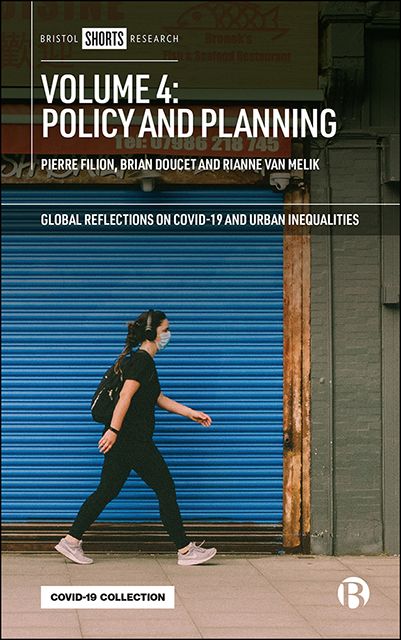Book contents
- Frontmatter
- Contents
- List of Figures and Tables
- Notes on Contributors
- Acknowledgments
- Preface to All Four Volumes of Global Reflections on COVID-19 and Urban Inequalities
- One Introduction: Policy Making in the Face of Uncertainty and Inequality
- Part I COVID-19 and Urban Changes
- Part II The Pandemic, Social Inequality, and Mobilization
- Part III Municipal and Urban Policy Responses
- Index
Fourteen - Transnational Experiences of COVID-19: Transferable Lessons for Urban Planning Between the Global South and the Global North
Published online by Cambridge University Press: 25 April 2023
- Frontmatter
- Contents
- List of Figures and Tables
- Notes on Contributors
- Acknowledgments
- Preface to All Four Volumes of Global Reflections on COVID-19 and Urban Inequalities
- One Introduction: Policy Making in the Face of Uncertainty and Inequality
- Part I COVID-19 and Urban Changes
- Part II The Pandemic, Social Inequality, and Mobilization
- Part III Municipal and Urban Policy Responses
- Index
Summary
Introduction
COVID-19 reveals that the equity dimension of planning, especially concerning the distribution of infrastructure, services, and amenities, is integral to urban resilience. While neoliberal approaches to economic and social life over the past 40 years have challenged this idea, the pandemic has helped planners to reassert the need for greater income equality and re-establish the effectiveness of coordinated and collectivized responses to disruptions.
This chapter explores these issues by focusing on transferable lessons from the experiences of Aalborg, Colombo, Melbourne, and Toronto, and on how urban planners can help address a range of inequalities and inadequacies aggravated by the pandemic. These cities were selected to demonstrate how city size, political institutions, and level of economic development, along with location in different parts of the world, affected reactions to the pandemic.
In this chapter, we review the experience of lockdown and phased reopening in each city-region over the first six months after the declaration of the pandemic in March 2020. We then consider the role of governance mechanisms and capacity in response to managing the devastating impacts of a public health crisis and associated economic, social, and spatial outcomes. By drawing upon examples from each city-region on resilient planning practice, we conclude by highlighting opportunities for mutual international learning in connection to pandemic and post-pandemic urban planning.
Pandemic, lockdown, and reopening in four cities
The four cities (and respective countries) experienced the pandemic and subsequent reopening of their economy in both shared and unique ways. Despite differences in overall population, density, and profile, all four territories recorded relatively low case fatalities and deaths as a percentage of population over the first wave of the pandemic (Table 14.1).
Lockdowns of differing intensity occurred in all four territories, and each location has pursued gradual, phased reopening (Table 14.1). The four city-regions all closed borders, restricted international air travel, and imposed emergency measures to suppress, contain, and mitigate the disease. However, despite these ‘shared’ responses, differences in timing, effectiveness, and circumstances highlight important distinctions in the intraurban geographies of disease. They also reveal how responses across the four territories addressed underlying and emergent inequalities.
Table 14.1 shows the diverse ways in which emergency measures were implemented in each context. Corroborating Bailey et al (2020), the outbreak was spatially uneven within cities, regions, and countries, as well as between countries.
- Type
- Chapter
- Information
- Volume 4: Policy and Planning , pp. 145 - 158Publisher: Bristol University PressPrint publication year: 2021



